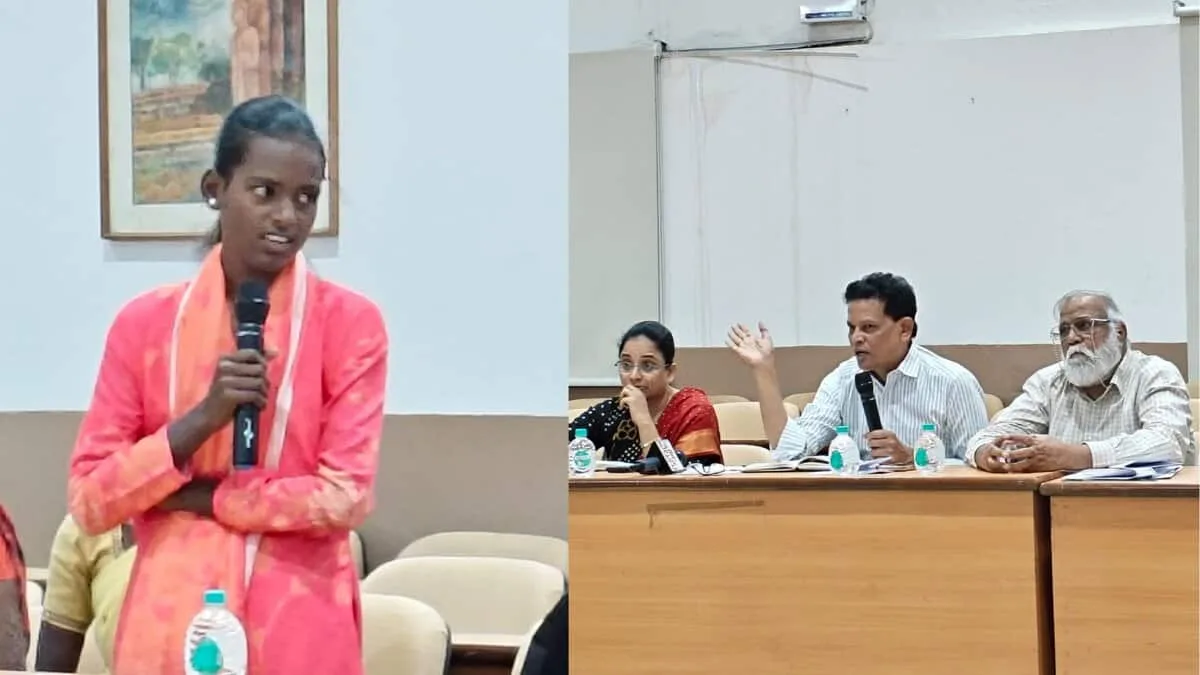Hyderabad: Government junior colleges in Telangana have been facing serious challenges from private and corporate institutions, which have found new ways to attract parents and students. While the political establishment, irrespective of the party in power, has failed to control this onslaught, intermediate public education now stands at a crossroads, requiring urgent policy intervention.
During a public hearing held by the Telangana Education Commission in Hyderabad on Wednesday, 11 June, civil society organisations, teachers’ unions, student organisations, and parents presented the various issues affecting government junior colleges and offered their suggestions for reform.
Among the most pressing concerns is the lack of dedicated funding.
General Secretary, Telangana Government Junior Lecturers’ Association, Dr Kuppisetti Suresh said that while government schools receive funds through the Sarva Shiksha Abhiyan (SSA) and higher educational institutions through the Rashtriya Uchchatar Shiksha Abhiyan (RUSA), there is no funding agency that supports intermediate public educational institutions.
President, Telangana Gazetted Junior Lecturers’ Association, Dr P Madhusudhan Reddy noted that in the past 11 years, only Rs 62.36 lakh had been allocated to government junior colleges for operational expenses. He added that it was only recently that Rs 10,000 was sanctioned to each of the 424 junior colleges in the state.
Highlighting that 95 percent of students in government junior colleges belong to SC, ST, BC, and minority communities, both lecturers questioned the rationale behind the state government reimbursing fees and awarding scholarships to students from the same sections studying in private intermediate colleges, where annual fees can go as high as Rs 1.5 lakh.
Causes for a shift from government to private junior colleges
Sonu, a resident of Jawaharnagar in Medchal-Malkajgiri district, attended the hearing with her mother, pleading for help from Chairman, Telangana Education Commission, Akunuri Murali.
The daughter of a single mother, Sonu had enrolled in a government junior college in the city but had to discontinue her education due to the delayed bus service, which caused her to miss two classes daily and return home only after 7 p.m. She also struggled to obtain her caste certificate (SC–Madiga).
“My mother couldn’t afford private education. I wanted to clear the civil services examination. Even though I wanted to study, I couldn’t,” she said, breaking into tears.
Murali assured her that she would be accommodated in a social welfare residential junior college at Keesara.
In Sonu’s case, there was no government junior college in Kapra mandal where she resides, despite a population of 4–5 lakh people.
According to officials, there are 196 private junior colleges in Medchal-Malkajgiri district, but only about five government junior colleges.
Representative, Aksharam NGO, M Anjaneyulu opined that while accessibility is a key issue, the quality of education in government colleges is another concern. He noted that private colleges are exploiting this gap by instilling fear in parents and convincing them to invest heavily in so-called “result-oriented” education.
He observed that maintaining a uniform syllabus has become a challenge, with more families moving towards CBSE to remain competitive. Adding to the problem is the lack of coaching in government colleges for exams like JEE, NEET, and other competitive tests.
Another factor contributing to low enrolment in government junior colleges is the upgradation of gurukuls to include Classes 11 and 12, as well as the establishment of Kasturba Gandhi Balika Vidyalayas (KGBVs) and model schools.
Exploitation by corporate institutions, lack of regulatory oversight
A group from the National Students’ Union of India (NSUI), the student wing of the Congress, presented book sets being sold by institutions such as Narayana, Sri Chaitanya, and Tapasya for as much as Rs 22,000 (for residential students), and Rs 17,000 to Rs 18,000 (for day scholars).
President, NSUI Telangana, Yadavalli Venkataswamy, said that although the maximum fee chargeable as per the Board of Intermediate Education (BIE) guidelines is Rs 5,000, corporate colleges have been charging nearly Rs 2.5 lakh annually under the guise of semi-residential education.
“Regulations state that if the fee is more than Rs 28,000 in private schools, it has to be ratified by the parents’ committee. An increase in fees by even 10 percent also requires ratification in schools. But for private intermediate colleges, nobody knows whether they even have the required land for establishment, or anything about the fees they are charging,” said Dr P Madhusudhan Reddy.
“Despite the High Court pulling up the government over corporate colleges running classes during summer vacation, BIE officials told the court that students are studying and they are teaching. What else can be more shameful than this?” he added.
Venkataswamy also alleged that many of these institutions do not have valid permissions to operate, and that student suicides in such institutions are on the rise. Yet, District Intermediate Education Officers (DIEOs) have failed to take any action.
“The recent advertisements by corporate and private institutions stating ‘Powered by Akash, Physics Wala, and Vedantu’ represent an emerging trend in exploiting students and parents with exorbitant fees. When we report this to the DIEO, he says he has no authority to stop them. Then why is he sitting in that position?” Venkataswamy questioned.
Student leader, Palle Murali, pointed out that Allen Career Institute was charging Rs 4.3 lakh for just the first year of intermediate education.
Activists were unanimous in stating that unless the state allocates at least 15 percent of its budget to education, with a portion specifically directed towards government junior colleges, there would be little hope for strengthening public intermediate education.







